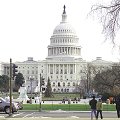- By Office of Congressman Tom Reed
- News
 Print
Print  As the President sends formalized notice to Congress about the finalization of the Trans Pacific Partnership (TPP), Tom Reed reiterated his opposition to the deal.
As the President sends formalized notice to Congress about the finalization of the Trans Pacific Partnership (TPP), Tom Reed reiterated his opposition to the deal."We care about creating quality, family sustaining jobs in our region. While we are big supporters of exporting products made here in the U.S. around the world, we can't support a trade deal that would undercut and harm American workers," said Reed.
Reed opposes the TPP trade agreement because it does not open foreign markets to U.S. dairy products, particularly in Canada, leaving New York dairy farmers behind.
Reed also says the bill lacks provisions to prevent currency manipulation, which allows foreign governments to gain an unfair advantage against U.S. manufacturing.
Finally, he opposes the proposal because it lacks stringent protections for intellectual property of American innovators leaving them vulnerable to exploitation and theft by foreign governments. These protections would prevent the patents and inventions from being stolen and robbing individuals and American businesses of valuable resources.
"This is a fundamental question of fairness. This agreement short changes our farmers, doesn't do enough to protect U.S. manufacturers and workers here at home and hurts the long term competitiveness of American businesses around the world," said Reed. "Our businesses and workers can compete, and win, on a fair and level playing field every time. We need agreements that encourage that work ethic, not inhibit it."
The Obama Administration sent notice to Congress on Friday that outlines how the administration would implement TPP if enacted. The move also prevents action on the agreement for an additional 30 days. The step is required as part of the Trade Promotion Authority law. The Trade Promotion Authority (TPA) legislation, which Reed supported, was passed Congress last year.
"We want to ensure that the American people are dealt with fairly and any trade agreement is brought out into the light of day. The Obama Administration shouldn't be allowed to sneak this, or any other trade agreement, into law without transparency," said Reed. "The trade promotion authority law makes sure that the American people, and members of Congress, know what is in the proposal and have an opportunity to make their voices heard."
It is not yet clear whether or not the agreement will be put to a vote before the President leaves office in January.
v12i32
